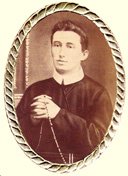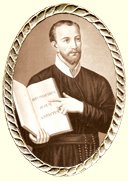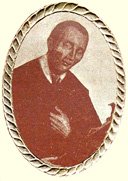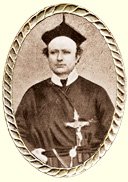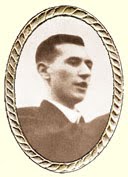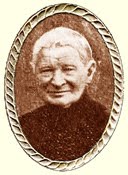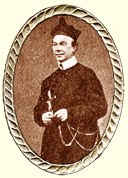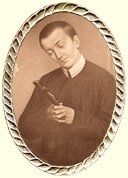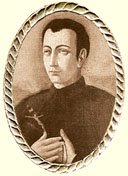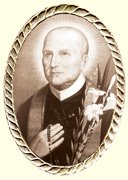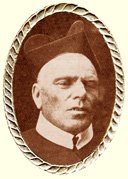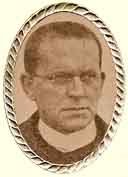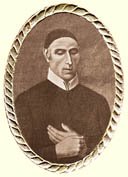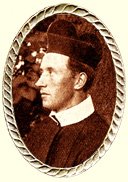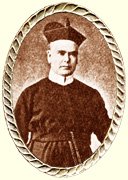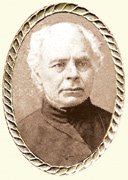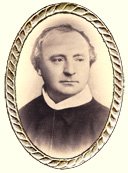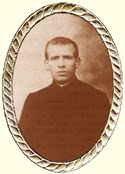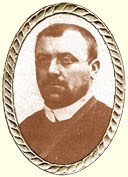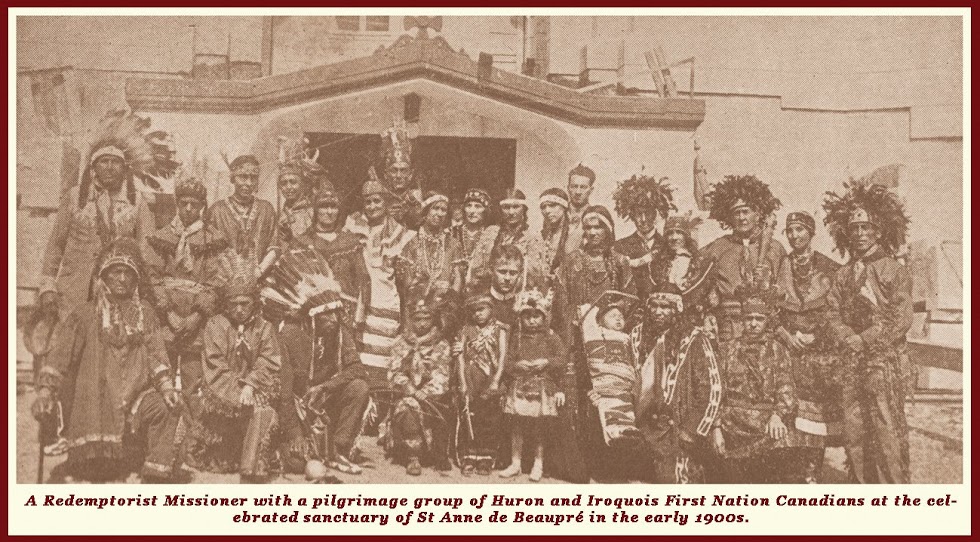Very Rev Fr Bernard Hafkenscheid, C.SS.R. (1807 – 1865) — Chapter II
 Doctor of Theology
Doctor of Theologyand One of the Greatest
Redemptorist Missioners of All Time
Written by Rev Fr M.J.A. Lans
Professor at the Minor Seminary of Haarlem, Holland
CHAPTER II
Even though the students, including Fr Bernard, left the institute, they always retained a special place for it in their hearts, Hageveld having been more of a family to them than an institute. Two of his companions at the school must be mentioned. Mgr Jean-Theodore Beelen, who would later become camerlengo to His Holiness Blessed Pope Pius IX, member of the Congregation of the Index, Doctor of Theology, Canon of Liege, Professor of Holy Scripture and Oriental languages and a prolific writer. And, Fr Cornelius Broere, later professor at Harlem Seminary and a master in Dogmatic Theology, Apologetics, History, Philosophy, Political Theory, Poetry, Literature and Fine Arts - and most of all a priest in the fullest sense of the word.
After the closure of the school Broere remained with Mgr Van Bommel while Fr Bernard and Jean Theodore returned to Amsterdam where they remained on the closest terms. If their parents sought either youngster they were always to be found at the house of one or the other. Here they began the study of Hebrew together. In the mean time their priestly vocations grew more and more certain.
But as they had not attended the Philosophical College they could not enter a seminary in the Netherlands. They had the idea to travel to Rome as had many of their former fellow students. At the time it was a journey of six to seven weeks. Also at this time the government decreed that anybody persuing Theological studies abroad would not be admitted to any public employemnt of ecclesiastical position. While negotiations with the Holy See were in process still the road to the seminary in reality remained closed.
At last after prayer and consultation they left Holland in 1828, bound for the Eternal City. After an interesting journey they arrived at their destination to the very great delight of their Catholic hearts, as is witnessed by a letter home from Fr Bernard: "Is it really true, and not an illusion? Am I really in Rome? Rome, this great capital of the Christian world, this city so full of science and of great historical memories? Yes, it is so, I am in Rome! Thanks be to God, I am in Rome! ..... Can you imagine entering Rome? Nothing could give you an idea of our joy...." It would be here that Fr Bernard would begin his studies, launch his Missionary career and most importantly lay the foundations of his perfection so solidly as to be the edification of all his companions.
ETUDES DE BERNARD A AMSTERDAM
Pour cela, il fallait, croyait-il, tendre à diminuer les divergences religieuses qui étaient la principale source de division. C'était vouloir faire disparaître le catholicisme, car le catholicisme ne souffre aucune diminution.
Dans ce but, le gouvernement devait, selon lui, prendre en main l'éducation de la jeunesse catholique qui se destinait à l'état ecclésiastique. Un pas décisif vers ce but fut fait en 1825, au moyen de plusieurs décrets royaux, ceux entre autres du 14 juin et du 11 juillet. On créait une maison générale d'éducation pour le clergé catholique; l'Etat se réservait la nomination des professeurs et l'entière direction des études. Outre plusieurs branches préparatoires, on y enseignait les sciences qui ont pour objet la doctrine de la religion, ou celles qui y sont liées intimement. Qui n'a entendu parler du Collège philosophique de Louvain ? (car c'est de ce nom qu'on appela cette maison, nom fort singulier et peu propre à dissimuler le but que l'on avait en vue)(1)
En vertu des décrets royaux, les sections inférieurs des séminaires devaient être fermées; tous ceux qui voulaient faire leurs études théologiques dans les sections supérieures, étaient obligés de recevoir leur première éducation au Collège philosophique. Les catholiques protestèrent unanimement. En effet, l'Eglise possède le droit de former elle-même ses ministres; ce droit lui est cher, et elle ne le cède à personne. Elle sait que l'ordre et la discipline, la vertu et la foi auraient bientôt fait naufrage chez des prêtres qui devraient recevoir leur éducation sacerdotale tantôt d'un roi anti-catholique, tantôt d'un roi incrédule, aujourd'hui d'un tyran, demain d'un prince immoral.
La première nouvelle de l'apparition des décrets royaux parvint au régent de Hageveld le jour même où l'on célébrait la fête de saint Louis de Gonzague, patron de la jeunesse studieuse. C'était juste au moment où il se voyait environné de ses jeunes élèves, joyeusement assis à une table un peu mieux servie que de coutume. Il y avait là, nous semble-t-il, un contraste digne d'attention... C'était un présage que l'injustice et la violence ne prévaudraient pas toujours contre la faiblesse; c'était un indice qu'elles ne tiendraient pas devant la prière que les enfants fidèles de l'Eglise allaient faire monter vers ces saints que l'on injuriait et qui ont tant de pouvoir auprès de Dieu. Pour Hageveld en particulier, ce fut un pronostic que ce bel établissement ne périrait pas définitivement, mais qu'il revivrait un jour avec une gloire nouvelle, grâce à l'intercession de saint Louis, le puissant protecteur de ses enfants. Telles furent, nous n'en doutons pas, les pensées et les réflexions de M. Van Bommel en ce moment d'affliction.
Bien qu'il eût mesuré du premier coup la gravité des circonstances, ce digne supérieur ne perdit pas un moment courage. Longtemps même il continua d'espérer que ces mesures vexatoires seraient complètement modifiées ou ne seraient jamais mises à exécution. Dans une audience que lui accorda le Souverain, il prit à tâche de démontrer avec clarté et vigueur que les décrets ne portaient pas seulement préjudice aux droits des sujets catholiques de Sa Majesté, mais qu'ils pourraient encore avoir un jour les suites les plus funestes pour la paix du royaume. "Sire, dit-il, si l'on en vient une fois aux mains, il sera trop tard pour revenir en arrière." Ces paroles étaient une prédiction de la révolution belge.
Le roi parut convaincu ou du moins fortement ébranlé. Malheureusement des influences contraires prévalurent. A la vérité, en ce qui concerne Hageveld, l'exécution des décrets se fit d'une manière indulgente. Le gouverneur, Tets Van Goudriaan, vint en personne annoncer la décision irrévocable du roi. Lui-même la notifia aux élèves en pleurs, en ajoutant que l'on pouvait être assuré de la sympathie affectueuse de Sa Majesté. Quoi qu'il en soit, M. Van Bommel eut la douleur de voir périr d'un seul coup, avec son établissemnt, le fruit de tant de soins et de travaux, et de perdre ainsi ses plus belles, ses plus chères espérances." (2)
C'est Mgr. Van Bommel, qui, dans sa lettre contre Siegenbeek, va raconter lui-même comment se fit cette notification du Gouverneur de la Hollande septentrionale. "Dans un allocution courte, mais substantielle, M. le Gouverneur déclara sans détour le but de son arrivée. Il venait exécuter un décret général, qu'il respectait sans en approfondir les motifs. Ce décret, il regrettait vivement d'être dans la nécessité de l'appliquer à un établissement de sa province qui s'était concilié l'estime et la confiance universelles. M. le Gouverneur fut sensiblement ému en voyant la douleur profonde et générale que sa déclaration venait de produire chez ses auditeurs. Tandis que tous, ou presque tous quittaient la salle en pleurant, il me dit en me serrant la main : "Je suis touché, je suis extrêmement peiné. Ce n'était pas une école, c'était une famille. Je ferai encore mon possible pour détourner ce coup ou pour l'adoucir; et si jamais il arrive des temps plus favorables, je ne négligerai rien pour rouvrir cette maison que je dois fermer aujourd'hui."
Cependant, comme pour faciliter aux jeunes catholiques leur passage au collège de l'Etat, on offrit à M. le régent Van Bommel, la direction du Collège philosophique. Mais cet homme respectable ne se méprit point sur le but de cette offre généreuse en appararence. Aussi, ni le Gouverneurde la province, ni le Ministre de l'Intérieur, ni le directeur général des affaires concernant le culte catholique, qui déjà lui avait envoyé sa nomination, ni le roi lui-même, ne purent le décider à entrer dans les vues du gouvernement. C'est assurément grâce à cet exemple que les élèves de M. Van Bommel, fidèles aux principes de l'Eglise catholique, préférèrent aller poursuivre leurs études à l'étranger, plutôt que d'exposer dans une institution équivoque leur foi et leur vertu.
Ainsi, malgré les protestations des catholiques sincères, malgré les énergiques réclamations de Sa Sainteté, le Pape Léon XII, auprès du gouvernement hollandais, les décrets du roi furent maintenus. La triste nouvelle de la suppression du séminaire fut communiquée aux parents des élèves par une circulaire; les termes dans lesquels elle était conçue, attestent clairement combien le coeur du régent de Hageveld était péniblement affecté.
"J'ai le regret, disait-il, d'avoir à vous apprendre par cette lettre que Son Excellence le Conseiller d'Etat, Gouverneur de la Hollande septentrionale, s'est rendu le 1er de ce mois (septembre) à Hageveld, et que, sur l'ordre de Sa Majesté, le roi, il a annoncé tant à nous qu'à nos élèves la suppression de ce séminaire. Cette suppression doit avoir lieu avant le 1er octobre prochain, sous ma responsabilité personnelle.
"Le jour de départ sera ultérieurement fixé par nous. Nous aimons à croire que vous ne voudrez pas le devancer, vu que nous nous proposons d'employer ces derniers jours à inculquer encore plus profondément chez tous et chacun de nos élèves, les principes qu'avec tant de soin et de tendresse nous avons tâché de leur donner, et qui doivent être la règle de leur conduite future en même temps que la source de leur bonheur.
"Recevez nos remerciements affectueux de la confiance si entière et si honorable pour nous, avec laquelle vous nous avez confié le précieux dépôt de vos enfants. Nous ressentons la plus profonde tristesse de ne pouvoir désormais y répondre que par les voeux les plus ardents; ces voeux, nous les offrons au Seigneur pour leur bonheur et pour le vôtre. Une soumission silencieuse aux décrets impénétrables de la divine Providence, qui dirige ou permet tous les évènements, voilà ce qui est, dans les circonstances présentes, notre plus saint devoir. Nous tâchons de vous précéder, vous et vos enfants, dans cette voie, et nous nous recommandons pour toujours à votre honorable amitié.
"Au nom de tous les directeurs,
"(Signé) C. Van Bommel."
Ce fut un jour bien triste que celui de la dispersion des membres de cette "famille". M. Van Bommel, les larmes aux yeux, fit ses adieux à "ses chers élèves", après les avoir préparés à leur nouvelle situation, par un exercice de piété spécial et tout-à-fait approprié à la circonstance.(3)
Tous emportèrent les plus doux souvenirs de leur séjour à Hageveld. Ils quittèrent le séminaire, le coeur plein de reconnaissance et d'amour envers leurs maîtres, et surtout envers ce respectable régent, dont une plume éloquente devait plus tard tracer le portrait que voici :
"C'était un maître, un guide, un ami, un père. Il fut éminent entre beaucoup d'autres, personne ne le surpassa. Ces connaissances variées, fruit d'un beau talent, cette bienséance délicate, ce goût exquis, cette vraie manière de traiter avec les hommes, et, qui plus est, ce caractère noble, ce zèle ardent pour la religion, cette fidélité inébranlable à la vertu et au devoir, cet amour de l'Eglise du Christ joint au respect de ses droits et de ses préceptes, cette piété tendre, cette foi vive, tout cela faisait de M. Van Bommel un maître accompli. Il faut ajouter que tout cela il avait le don de le faire passer de son âme dans l'âme des jeunes lévites, ses élèves ... Aussi lorsque plus tard cet illustre maître, qui attachait un si haut prix à l'éducation de la jeunesse, dut aller prendre la direction d'un immense diocèse, la direction de la vieille "Sancta Legia", il laissa un souvenir impérissable dans sa patrie, dans son cher Hageveld ... où l'esprit du grand fondateur ... s'est si bien conservé !(4)
Dans la suite, chaque fois que l'occasion s'en présentait, le P. Bernard visitait avec un amour de prédilection le lieu où fut jadis "l'Ancien-Hageveld", comme on l'appelle aujourd'hui. Plus d'une fois nous lui avons ouï dire ces paroles : "Il y a dans mon coeur une place que personne ne peut conquérir : cette place est pour Hageveld."
Il nous faut ici faire la connaissance des deux meilleurs amis de Bernard; car nous rencontrerons souvent leurs noms dans cette histoire. L'un, jeune amsterdamois, Jean-Theodore Beelen, entra avec lui à Hageveld. Du même âge que Bernard, il avait, comme lui, des parents sincèrement catholiques; tout en suivant une autre carrière, il devint, lui aussi, une des gloires de la sainte Eglise. Pendant près de quarante ans qu'il passa à l'Université de Louvain, M. Beelen s'acquit par son immense érudition, dont de nombreux ouvrages furent les fruits, une vaste renommée et dans son pays et à l'étranger.(5)
L'autre, Corneille Broere, un peu plus avancé en âge que Bernard Hafkenscheid, l'avait devancé aussi dans la carrière des études. Né pareillement à Amsterdam de parents très vertueux, il fut un de ces hommes que la divine Providence donne rarement au monde. La même bouche éloquente qui nous a tracé le portrait de Mgr. Van Bommel, s'est exprimée comme il suit en présence des dépouilles mortelles de Broere : "Comme écrivain en matière de théologie dogmatique, d'apologétique, d'histoire, de philosophie, de politique, de poésie, de belles-letttres, de beaux-arts, M. Broere était d'un mérite incomparable. Dans quelque branche que ce fût de la science sacrée ou profane, tout sujet traité par lui acquérait une importance nouvelle. On peut dire de ce grand écrivain ce qui a été dit d'un autre génie : "Quidquid tetigit, ornavit". Tout écrit de Broere était empreint du sceau caractéristique de son génie, et ce génie brillait à chaque page en traits parfaitement reconnaissables ... Mais quelques riches, quelques éminents que fûssent en cet homme unique les dons d'intelligence et de science, les dons et les qualités du coeur n'étaient nullement inférieurs. Le plus grand mérite de Broere, le principe de sa gloire immortelle et de sa couronne, c'est d'avoir été et n'avoir jamais cessé d'être, avant tout et en tout, un prêtre dans toute l'acceptation du terme.(6)
Il mourut en 1860, le jour de la fête des Saints Innocents. Son nom est resté gravé en caractères ineffaçables dans la mémoire de tous ceux qui l'ont connu, surtout de ceux qui furent ses élèves au séminaire de Harlem, où il a passé les trente années de sa vie sacerdotale comme professeur de philosophie et d'histoire ecclésiastique.
Hageveld étant fermé, les trois amis rentrèrent au sein de leurs familles, et goûtèrent dans leur mutuelle amitié les plus suaves délices du jeune âge. Cependant Broere retourna bientôt à Hageveld. Il fut du petit nombre des élèves qui obtinrent la permission spéciale de demeurer quelque temps auprès du régent Van Bommel. Il l'accompagna ensuite à Liège, et Hageveld ayant pu s'ouvrir de nouveau, il y revint, en 1830, occuper la chaire de philosophie. Les deux autres amis demeurèrent à Amsterdam; ils contractèrent ensemble une liaison si étroite, que leurs parents étaient toujours sûrs de trouver Beelen chez Hafkenscheid ou Hafkenscheid chez Beelen.
Egalement avides de science, nos deux jeunes gens eurent l'idée de l'étude de la langue hébraïque. Avec non moins d'ardeur, ils continuèrent à Amsterdam la lutte scientifique qui s'était engagée entre eux à Hageveld. Là encore, comme au séminaire, ils s'appliquèrent, sous la conduite vigilante de leurs parents, à l'acquisition des vertus dont ils prévoyaient qu'ils auraient besoin un jour comme prêtres. Leur piété, leur fidélité scrupuleuse à chacun de leurs devoirs étaient pour les membres de leurs familles et pour leurs amis, un sujet de bien consolante édification. C'est ainsi qu'il passèrent trois années sous le toit paternel.
La vocation des deux amis à l'état sacerdotal s'était de plus en plus accentuée. Ils voulurent donc poursuivre jusqu'au bout l'étude de la théologie. Mais, comme ils n'avaient pas fait leurs études préparatoires au "Collège philosophique", ils se virent refuser l'entrée du séminaire de Warmond. Dès lors, quel parti prendre, sinon de s'en aller, à l'exemple de plusieurs de leurs amis, suivre les cours de théologie dans un autre pays ? Rome fut la ville de leur choix, Rome où déjà beaucoup d'étudiants hageveldois les avaient précédés. Mais leurs parents allaient-ils se montrer favorables à leurs désirs ? Permettre à des jeunes gens de vingt ans de faire un voyage de cinq à six semaines, se séparer d'eux pour un laps de plusieurs années consécutives, ce n'était certes pas une perspective bien rassurante. D'ailleurs, le 14 août 1825, parut un décret royal promulgant la décision suivante : "Il y a lieu de craindre que des jeunes gens, qui vont faire leurs études à l'étranger, ne soient imbus de principes contraires aux institutions de la patrie et aux sentiments qui doivent animer les enfants de la Néerlande. En conséquence, nous décrétons que les jeunes gens d'origine hollandaise, qui, à partir du 1er octobre prochain, auront fait leurs études théologiques hors du pays, ne seront promus par Nous à aucun emploi public, ni admis à exercer aucune fonction ecclésiastique."
A la vérité, il y eut un moment où les affaires des Catholiques semblèrent prendre une tournure plus favorable; ce fut lorsque, après bien des retards calculés dans les négociations entamées avec Rome,(7) après de grandes difficultés surmontées, le Concordat du 18 juin 1827 fut conclu entre le Pape Léon XII et le roi Guillaume Ier. Il y était stipulé que chaque diocèse aurait son chapitre et son séminaire. Mais en fait, la pacification religieuse n'eut pas encore lieu; l'exécution du concordat fut remise d'un jour à l'autre, et les séminaires restèrent fermés.
Dans cet état de choses, les parents de Bernard et de Beelen consultèrent plusieurs hommes d'intelligence, et prièrent ardemment le Seigneur de leur faire connaître sa volonté dans une affaire de telle importance. Encouragés par ceux qu'ils avaient consultés, animés par l'esprit de Dieu, alléchés par la douce espérance de pouvoir un jour contempler leurs fils au saint autel, les parents se sentirent moins effrayés à la vue des grandes difficultés que présentait un semblable projet; ils finirent donc par accéder au désir de nos deux jeunes gens. En conséquence, ceux-ci se hâtèrent de fixer le jour du départ; et le 28 septembre 1828, tout baignés des larmes de leurs parents et de leurs proches, fortifiés par la bénédiction de leurs vénérables pasteurs, se confiant aux soins de la divine Providence, ils prirent le chemin de la Ville éternelle.
Il serait sans doute intéressant pour nos lecteurs de prendre connaissasnce des relations détaillées de voyage que Bernard envoya à ses parents. Elles trahissent souvent une grande vivacité d'imagination, une grande justesse de jugement, un goût exquis des beautés artistiques, et toujours une piété sincère. Mais la crainte d'être trop long nous engage à nous restreindre.
A La Haye, nos deux voyageurs firent la rencontre, à leur grande joie, de leur bien-aimé régent, M. Van Bommel. Ce digne prêtre gémissait encore sous le poids du décret royal; sans aucun doute il ne put se défendre d'un sentiment de tristesse, au moment où il leva la main pour bénir le long et pénible voyage de ces jeunes gens qu'il eût tant aimé conserver auprès de lui. C'était avec un enthousiasme tout juvénile que Beelen et Bernard s'extasiaient devant les monuments des grandes villes qu'ils traversaient; mais c'était avec la piété la plus vive qu'ils recommandaient à Dieu et leur voyage et leur avenir dans chaque église qu'ils visitaient. L'aspect des montagnes de la Savoie les frappa singulièrement; le spectacle de cette nature sévère et grandiose leur communiqua un mâle courage. Ils mettaient souvent leur plaisir à descendre de la diligence pour faire une partie de la route à pied. Voici ce que Bernard écrivit à ses parents à propos du passage du mont Cenis :
"Cette montagne, nous l'avons gravie à pied, bâton à la main et pipe à la bouche. (8)Tous les autres voyageurs dormaient dans la diligence; mais moi, j'avais trop entendu parler du mont Cenis, pour ne pas sacrifier quelques misérables heures de repos au plaisir de le contempler. Nous arrivâmes à nous deux jusqu'au sommet de la montagne en devançant toujours la voiture, et cependant elle était tirée par six chevaux. Autour de nous, tout dans la nature était revêtu d'un habit d'hiver, toutes les cîmes des montagnes et même notre chemin en certains endroits étaient couverts de neige et de glace; mais l'idée que nous voyagions sur le mont Cenis faisait que nous ne songions pas même au froid. Vous ne manquerez pas de dire que c'était bien téméraire à nous d'entreprendre de nuit un tel voyage; mais vous eussiez dû voir quel beau clair de lune il faisait, et comment nous pouvions tout distinguer à merveille !
Je ne puis comprendre que l'on préfère de passer une nuit agitée dans une diligence plutôt que de jouir des beautés d'une telle contrée. Bien que nous eussions fait une marche de trois à quatre heures, nous arrivâmes encore trop tôt à la descente de la montagne. Mais la diligence ne tarda pas à nous rejoindre, et l'on nous pria d'y monter."
Le 1er novembre, les voyageurs arrivèrent de grand matin à Suse, la première petite ville de l'Italie. "Nous voilà en Italie ! écrivait Bernard, nous voilà devenus de vrais ultramontains ! Croyez-le, chers parents, notre arrivée dans ce pays nous a fait éprouver une bien douce émotion. Combien nous nous félicitons du voyage heureux que nous avons fait jusqu'ici ! Néanmoins, nous sentons croître de plus en plus en nous le désir d'arriver enfin à Rome. Nous avons franchi toute la montagne, et cependant il nous reste une longue route à parcourir."
 Il fallut encore vingt jours pour arriver au terme du voyage. Enfin à Florence, les deux amis montèrent dans la voiture qui devait les conduire jusqu'à Rome. Leur impatience ne faisait qu'augmenter à mesure qu'ils approchaient de la Ville éternelle ! Le feu de la jeunesse qui les enflammait ne leur permit plus de supporter les retards de la voiture publique. A Lastorte, où devait se faire une petite halte, ils laissèrent la diligence et se dirigèrent à pied vers Rome. Le sentiment dont ils furent pénétrés au moment où ils venaient d'atteindre le terme de leur voyage, Bernard l'exprime dans une lettre à ses parents : "Est-ce donc vrai, dit-il, et ne suis-je pas dans l'illusion ? Suis-je réellement à Rome ? à Rome, cette grande capitale du monde chrétien, cette ville si pleine de science et de grands souvenirs ? Oui, il en est ainsi, je suis à Rome ! Grâce à Dieu, je suis à Rome ! C'est le 20 de ce mois (novembre) à deux heures après-midi, que j'y suis entré. - En diligence ? - Non, j'y suis entré en courant. De Lastorte, qui est à trois lieues de Rome, nous sommes allés à pied. La voiture s'y arrêta et l'on y restaura les chevaux. Pour nous, nous n'avions pas besoin de nous restaurer. Nous nous mimes en route, ayant toujours devant les yeux la coupole de Saint-Pierre. Impossible de dire notre allégresse, quand après un voyage de sept semaines, nous vîmes apparaître à nos yeux le lieu de notre destination. Vraiment ces trois heures s'évanouirent comme une ombre. Nous étions arrivés aux portes de la cité, alors que nous pensions en être encore bien éloignés. Nous ne cessions de nous répéter : Peux-tu t'imaginer que tu vas entrer à Rome ? Rien ne saurait donner une idée de notre joie; et, j'ose le dire, cette joie était innocente. La pensée que je trouverais à Rome ce que la Hollande me refuse, m'impressionnait vivement, et rendait mon bonheur si pur, que je crus pouvoir m'y abandonner sans réserve."
Il fallut encore vingt jours pour arriver au terme du voyage. Enfin à Florence, les deux amis montèrent dans la voiture qui devait les conduire jusqu'à Rome. Leur impatience ne faisait qu'augmenter à mesure qu'ils approchaient de la Ville éternelle ! Le feu de la jeunesse qui les enflammait ne leur permit plus de supporter les retards de la voiture publique. A Lastorte, où devait se faire une petite halte, ils laissèrent la diligence et se dirigèrent à pied vers Rome. Le sentiment dont ils furent pénétrés au moment où ils venaient d'atteindre le terme de leur voyage, Bernard l'exprime dans une lettre à ses parents : "Est-ce donc vrai, dit-il, et ne suis-je pas dans l'illusion ? Suis-je réellement à Rome ? à Rome, cette grande capitale du monde chrétien, cette ville si pleine de science et de grands souvenirs ? Oui, il en est ainsi, je suis à Rome ! Grâce à Dieu, je suis à Rome ! C'est le 20 de ce mois (novembre) à deux heures après-midi, que j'y suis entré. - En diligence ? - Non, j'y suis entré en courant. De Lastorte, qui est à trois lieues de Rome, nous sommes allés à pied. La voiture s'y arrêta et l'on y restaura les chevaux. Pour nous, nous n'avions pas besoin de nous restaurer. Nous nous mimes en route, ayant toujours devant les yeux la coupole de Saint-Pierre. Impossible de dire notre allégresse, quand après un voyage de sept semaines, nous vîmes apparaître à nos yeux le lieu de notre destination. Vraiment ces trois heures s'évanouirent comme une ombre. Nous étions arrivés aux portes de la cité, alors que nous pensions en être encore bien éloignés. Nous ne cessions de nous répéter : Peux-tu t'imaginer que tu vas entrer à Rome ? Rien ne saurait donner une idée de notre joie; et, j'ose le dire, cette joie était innocente. La pensée que je trouverais à Rome ce que la Hollande me refuse, m'impressionnait vivement, et rendait mon bonheur si pur, que je crus pouvoir m'y abandonner sans réserve."Ainsi Bernard, le coeur débordant de joie et de reconnaissance, venait d'arriver à la capitale du monde chrétien. C'est là qu'il va jeter le fondement de cet apostolat si fécond et si riche en mérites, qui plus tard lui vaudra l'admiration universelle; c'est là que son éducation scientifique s'achèvera et sera couronnée; là que sa vertu atteindra à une telle hauteur, qu'au jugement unanime de tous ceux qui l'on connu, sa conduite pouvait être proposée comme modèle à tous ses condisciples.
....To be continued...
(1) De Katholiek. Tom XXI, p. 280.
(2) De Katholiek. Ibid.
(3) De Katholiek. Ibid.
(4) De Katholiek. Tom. XXXIX, p. 28.
(5) Mgr Beelen est aujourd'hui (1877) camérier de Sa Sainteté Pie IX, de sainte mémoire, membre de la congrégation de l'Index, docteur en théologie, chanoine de Liège, professeur d'Ecriture Sainte et des langues orientales.
(6) De Katholiek. Ibid.
(7) Dès 1815, le gouvernement des Pays-Bas avait manifesté par son chargé d'affaires à Rome, J.G. Reinhald, le désir de régler, de concert avec le Saint-Siège, les affaires des Catholiques romains en Néerlande. Les négociations commencées à Rome, furent poursuivies en Hollande en 1823, selon le désir du roi. L'ambassadeur du Pape à La Haye était l'archevêque de Cyr, Ignace Naralli. Ces conférences s'ouvrirent le 13 novembre, mais elles restèrent suspendues depuis le 6 décembre 1823 jusqu'au 13 avril 1824. Reprises une troisième fois à Rome, elles aboutirent à la signature du Concordat de 1827.
(8) On sait que l'habitude de fumer est générale en Hollande; le clergé même ne fait point exception.
Read more...





















 The founding of the Redemptorist Monastery of St. Joseph’s, Dundalk, Ireland, is one of Father Harbison’s chief works - the noble pile of buildings which he erected will ever be a monument to his energy and zeal.
The founding of the Redemptorist Monastery of St. Joseph’s, Dundalk, Ireland, is one of Father Harbison’s chief works - the noble pile of buildings which he erected will ever be a monument to his energy and zeal.













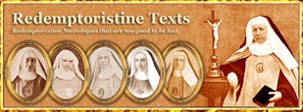
.jpg)









